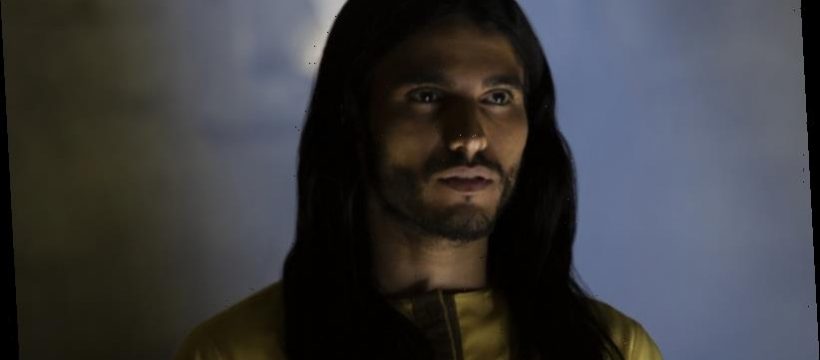It is, Michael Petroni happily admits, an “obvious idea”: what would happen in these uncertain times if a messianic figure who had miracles credited to his message once more appeared in the Middle East? In a world of geopolitical conflicts and faith-driven divides, how would people, organisations and governments react to an unknown preacher attracting followers who believe in a divine figure?
Netflix definitely liked the Australian screenwriter and filmmaker’s idea – they commissioned an entire scripted series based on it. Messiah, which is available in 190 countries on Wednesday, January 1, is a sweeping mystery where the unknown al-Massih (Mehdi Dehbi) offers messages from his “father” God, inspiring true believers, scornful doubters, and vehement adversaries. With Petroni as the creator, the show is a thriller about belief.
“Once you take it seriously, you start asking what would happen in this day and age if a figure like that was walking the Earth. How would people react? How would he influence people? How quickly would the news cycle find out?” Petroni says. “It was immediately complex and I knew it was not a simple story to tell. It had to be complex, it had to be multi-faceted, it had to have a massive ensemble cast, and it had to go all over the world.”
Messiah creator Michael Petroni with star Michelle Monaghan.Credit:Getty Images
Petroni, whose creative credits go back to the 2002 Australian feature film he wrote and directed, Till Human Voices Wake Us, which starred Guy Pearce and Helena Bonham Carter, opted for personal storylines over supernatural excess. First witnessed speaking against Syria’s civil war, the beatific al-Massih is seen through the eyes of those he impacts, whether it’s a hardened CIA agent (Michelle Monaghan), a Texan minister questioning his faith (John Ortiz), or a committed young Palestinian follower (Sayyid El Alami).
“You have to step away from all the big stuff. You could take the concept and do a big, flashy version which is fantastical, but to tell it best I thought, to get to the real issues, you have to go through the points of view of the characters. It was about going small,” Petroni says. “You have this overarching thing, but you view that massive story through the eyes of people on the ground. It’s a mosaic.”
That approach also allows the show to avoid focusing on just who a self-proclaimed son of God might represent, or vindicate. Given to mysterious pronouncements – “where do you lead us?” he’s asked, “to our destiny,” is the reply – al-Massih refutes the distinguishing conventions of each organised religion he encounters, whether it’s Islam, Judaism, or Christianity. Even so, Petroni is primed to steer clear of theological controversy.
A scene from Messiah.Credit:Netflix
“When you decide that you’re going to make a show about religion and politics you expect a certain amount of noise and a certain amount of fractiousness – that just comes with the territory,” he says. “But all I can say is that we bent over backwards to not be disrespectful or offensive or judgmental of any culture.”
Petroni has been moving back and forth between Australia and Hollywood since 1994, when he relocated to Los Angeles to study screenwriting. He had a previous series he co-created, a supernatural X-Files riff titled Miracles last half a season on US network television in 2003 (episodes kept getting bumped by news coverage of the invasion of Iraq), but this time he had significant allies in Hollywood power couple Mark Burnett and Roma Downey, the reality TV titan and Touched by an Angel star respectively, who have produced multiple faith-based series, including the widely criticised 2013 History Channel mini-series The Bible.
“Mark had read something of mine many years ago and wanted to work with me, and I had this project with a spec pilot and he loved it. Mark and Roma made the introduction and connection to Netflix, so without them it wouldn’t be on Netflix,” Petroni says. “In terms of their input to the content they loved what I was doing and to their credit they let me do it. They were very respectful of my vision and they trusted me.”
Burnett and Downey’s imprimatur helps connect Messiah to America’s vast Evangelical community, who believe the existence of Israel is connected to Biblical prophecy related to the second coming of Jesus Christ. Petroni’s show, which treats a wild idea with level-headed storytelling, can work with secular or spiritual audiences, even if they see it in different ways.
Mehdi Dehbi plays the unknown preacher Al-Massih in Preacher.Credit:Netflix
“It is a tightrope act and it felt like that at the time. But that was the fun and the risk of the show. That’s how you do meaningful work,” he says. “If you concentrate on being realistic about the issues facing the world right now, you should end up feeling like you’re in sync with what’s actually going on.”
The production is salted through with Australians, including director and executive producer James McTeigue (V for Vendetta, Sense8), director Kate Woods (Fighting Season), director of photography Danny Ruhlmann (Little Fish), and actor Wil Traval (Jessica Jones). Some of them Petroni had worked with before, others he admired. Hiring them was part of stepping up to be the showrunner: on Messiah Petroni ultimately had to have faith in his own decisions.
“For instance, during casting I wanted that to go a certain way, so it was up to me to stand up to Netflix and say, ‘this is who I really want’, and they had to back me or not,” Petroni says. “So there would be bullets of sweat on the forehead, hoping it was the right decision. That’s what the showrunner has to do.”
WHAT Messiah
WHEN Netflix from January 1, 2020
Source: Read Full Article



